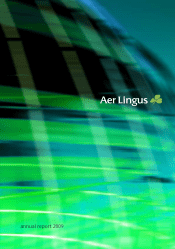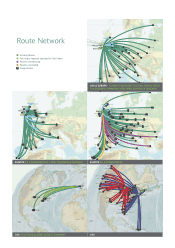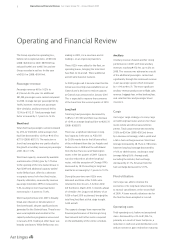Aer Lingus 2009 Annual Report Download - page 4
Download and view the complete annual report
Please find page 4 of the 2009 Aer Lingus annual report below. You can navigate through the pages in the report by either clicking on the pages listed below, or by using the keyword search tool below to find specific information within the annual report.
Chairman’s Statement Aer Lingus Group Plc – Annual Report 2009
Chairman’s Statement
Dear fellow shareholders
Commercial Overview
Last year was a very difficult one for Aer
Lingus. We experienced adverse conditions
in all our markets and particularly in Ireland,
where economic recession, high unemployment
and loss of consumer confidence contributed
to a significant decline in the demand for
air travel.
Conditions in the Irish market were exacerbated
by the introduction, in April 2009, of a €10
tax on air travellers. It is difficult to understand
why air travellers should be singled out for
such a tax at a time when Irish commercial
activity, and especially travel and tourism,
urgently requires stimulation rather than
taxation.
Our North American and UK markets were
also adversely affected by weak economic
and consumer conditions there along with
the strength of the Euro against the US dollar
and pound Sterling. Combined with the high
cost of accommodation and other goods
and services, our strong currency has made
Ireland an even more expensive option for
international travellers. Reductions in the
cost base of our economy at all levels will
be important for its future success.
The severity of the economic downturn
in 2009 and its impact on air travel was
unprecedented. Aer Lingus entered 2009
with too much capacity and several long haul
routes that were no longer sustainable in the
changed market environment. Fare discounting
to fill these surplus seats was not the solution,
and the lower fares we offered had the effect
of diluting our yields across the system. Our
average system-wide yield in Q1 2009 was
14.5% lower than in the same period of 2008.
These factors contributed to our operating
loss of €93 million in the January-June 2009
period. At the same time our gross cash declined
by €155 million, from €1,207 million at 31
December, 2008 to €1,052 million at 30 June,
2009. This reduction reflected approximately
€97 million spent on staff restructuring costs
and €137 million on aircraft purchases, with
these outflows being partly offset by inflows
from borrowings and other miscellaneous items.
The significant operating loss and the reductions
in our cash emphasised the need for significant
changes at Aer Lingus, which commenced
in April 2009.
First we re-geared our flight schedule to better
match the existing demand conditions, particularly
suspending our direct services to San Francisco
and to Washington D.C. However, by providing
Aer Lingus services to and from our established
bases in Boston, Chicago and New York with
an expanded range of connecting flights on
United Airlines and JetBlue Airways, we are
now offering indirect services to a much
broader range of North American cities than
were available a year ago. Our new code
share arrangements with Aer Arann are
designed to offer similar frequency and cost
improvements on our European network.
We also set about preserving our cash, through
the operational measures referred to above,
through reductions in our existing fleet and
through significant deferrals of our future
aircraft orders. We have stretched out future
orders so that new deliveries will generally
coincide with the need for replacement of
existing aircraft. We greatly appreciate the
assistance of Airbus SAS in achieving these
changes. We are confident that any future
growth opportunities can be serviced with
surplus aircraft from manufacturers, aircraft
lessors and other secondary markets.
These actions have had a positive impact
on our financial results. In the July through
December 2009 period, Aer Lingus reported
a small operating profit of €12 million (as
compared to an operating profit of €3 million
in the same period a year earlier). At the end
of 2009 our cash balance was €829 million. Aer
Lingus continues to have a strong balance sheet.
We also set about changing the culture, the
work practices and the cost base at all levels
in Aer Lingus. These changes started with the
board where, in order to give the programme
a kick start, our directors agreed to substantial
reductions in their fees. This was unprecedented
in Irish business and makes our directors’
fees among the lowest of equivalent plcs.
I greatly appreciate the support of all of
the directors in giving this leadership.
We also have the benefit of a substantially
new senior management team, lead by our
Chief Executive Officer, Christoph Mueller.
Christoph joined Aer Lingus on 1 September
and his drive, expertise, knowledge and
personality have been major contributors to
the cultural changes that we are experiencing
at Aer Lingus. Later in this report Christoph
will explain to you his vision for Aer Lingus
and how he, his management team and his
staff will make Aer Lingus more attractive to
our customers as Ireland’s Civilised Airline.
Radical changes in corporate culture –
particularly when they involve reductions in
pay and increases in work – are not easy to
achieve. However, Aer Lingus’ employees
have grasped and accepted the need for
change. Their contributions to the change
programme (named Project Greenfield) have
been outstanding and are hugely appreciated.
I believe that the changes that are being
implemented at Aer Lingus will inure to the
benefit of all our stakeholders; providing
a better and differentiated product for

















